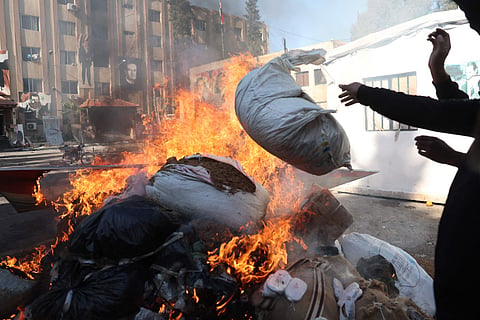Drugs fear and diaspora shaping Syria's recovery
Scars of war, a generation in exile, and a nation battling fear and illicit trade

As a result of the 14-year war, Syrians have dispersed widely across the region, with significant numbers in Turkey and Lebanon, where many remained in groups near or along the borders.
Meanwhile, Arab countries have integrated Syrians into their social fabric, offering them refuge and support. In Egypt, Saudi Arabia, the GCC countries and Morocco, Syrians have found a safe haven and opportunities for a dignified life.
Despite the well-documented oppression committed by the former Syrian regime against its citizens — instances of which shocked the world, such as the use of chemical weapons and barrel bombs — subsequent revelations have unveiled even more alarming activities.
Media reports have exposed the extensive production and processing of various types of narcotics and drugs within the Syrian Fourth Division’s camps, which were then exported to nearby regions and beyond.
The Fourth Division was at the centre of these illegal operations. The massive production of drugs, primarily Captagon and hashish, became the primary source of funding for armed factions previously referred to as the “resistance”.
This revelation underscores a stark contrast to prior assumptions: rather than solely relying on Iranian financial backing — purportedly amounting to billions of dollars, often at the expense of the Iranian people — these activities revealed a self-sustaining network financed through illicit drug trade.
Beyond any doubt or challenge
The extensive drug trade operations revealed a startling discrepancy: the funds generated were not entirely allocated to the groups they claimed to support. This stands in stark contrast to Hassan Nasrallah’s infamous speech on Nov. 17, 2017, in which he asserted, “Hezbollah’s weapons, salaries, and sustenance come from Iran.” This declaration, repeated in subsequent speeches, was presented as an unequivocal truth, beyond any doubt or challenge.
It has become evident that the majority of the funding originates from the drug production and trade industry, which generates billions of dollars. These resources are funnelled into elements that have devastated nations, fuelled division and hatred among citizens, and, ultimately, achieved nothing in terms of liberating even a single inch of Palestine.
On the contrary, these actions have contributed to the suffering of Palestinians, even resulting in deaths within some of their own camps.
The revelation of this deceit is crucial at this juncture, allowing the public to understand that the agenda is not about liberation but rather an ever-expanding plan serving destructive aims.
On the other hand, the regime’s downfall revealed that a generation of Syrians has come of age in the diaspora. Many Syrians who found refuge abroad have managed to rebuild their lives, both professionally and culturally, within these new environments. Meanwhile, those who remained inside Syria have been deeply scarred by a pervasive atmosphere of fear — what might be termed “syndrome of intense fear.”
In the emerging landscape of a new Syria, two distinct groups can be observed: one defined by lingering fear and the other by optimism, eager for swift change and yearning to recreate something resembling the stability and progress they experienced in the diaspora.
Bridging this divide requires, first, an understanding of the psychological motive driving the demands of both groups, and second, a recognition of the division imposed by their disparate circumstances. Ignoring this divide — or pretending it does not exist — risks undermining the foundation needed to establish a civil state on solid legal principles.
Despite the tremendous suffering endured by the Syrian people across its various groups, the challenge of rebuilding a modern state remains the most formidable task ahead. Unlike Iraq’s post-conflict trajectory, Syria has witnessed swift Arab engagement.
A notable example was the Gulf Cooperation Council’s visit, led by Kuwait’s Minister of Foreign Affairs, as Chair of the current session, accompanied by the GCC’s Secretary-General, to deliver a clear message to the new Syrian regime. This was soon followed by the first foreign visit of Syria’s Foreign Minister under the new regime to Saudi Arabia.
Saudi Arabia, as the cornerstone of the Arab world, with its substantial regional and international initiatives in recent years, can serve as a critical support and catalyst in overcoming the anticipated obstacles.
Success in this endeavour will, however, require earnest collaboration from the new Syrian leadership.
Mohammad Alrumaihi is an author and Professor of Political Sociology at Kuwait University
Sign up for the Daily Briefing
Get the latest news and updates straight to your inbox



